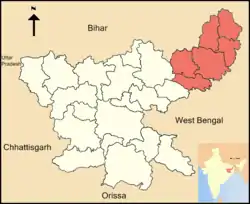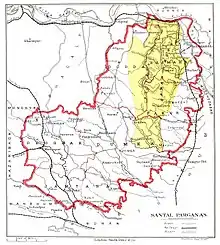Santhal Pargana division | |
|---|---|
Division of Jharkhand | |
 Location of Santhal Pargana in Jharkhand | |
| Coordinates: 24°30′N 87°30′E / 24.500°N 87.500°E | |
| Country | |
| State | Jharkhand |
| Established | 2000 |
| Headquarters | Dumka |
| Districts | Godda district, Deoghar, Dumka, Jamtara, Sahibganj, Pakur |
| Government | |
| • Commissioner | Shri Lalchand Dadel, I.A.S |
| Area | |
| • Total | 12,601 km2 (4,865 sq mi) |
| Population (2011) | |
| • Total | 6,969,097 |
| • Density | 550/km2 (1,400/sq mi) |
Santhal Pargana division constitutes six district administration units known as the divisions of Jharkhand state in eastern India.
Origin of name
Santhal Pargana derives its name from two words: "Santhal", a major inhabited tribe in the region and Pargana, a unit of administration in Persian language used mostly by medieval rulers.
Location
Santhal Pargana is one of the divisions of Jharkhand. Its headquarters is at Dumka. Presently, this administrative division comprises six districts: Godda, Deoghar, Dumka, Jamtara, Sahibganj and Pakur.

History
This region is mentioned as Kajangala in different ancient literatures specially in Buddhist literatures. It is mentioned that the Chinese monk-traveller Xuanzang (Hiuen Tsang) travelled from Champa (recent Bhagalpur) to Kajangala and then proceeded to Pundravardhana (recent Bangladesh) in the 7th century AD. He says that the northern limit of its territory (means Sahebganj) was not very far from the Ganges. The forests to the south had plenty of elephants. The people were straight forward, talented and devoted to education.[1]
In the system of Permanent Settlement, British encourage paharia of Rajmahal hills to practice settled agriculture but they refused to cut trees. Then British officials attracted attention to Santals who were ready to clear the forests for settled agriculture. In 1832, a large number of area demarcated as Damin-i-koh. Santal from Cuttack, Dhalbhum, Birbhum, Manbhum, Hazaribagh migrated, clear forest tracts and started cultivating these lands as peasants. British collected tax from Santals as revenue. The imposition of taxes, exploitation by Zamindar and money lenders sparked Santal rebellion. The Sidhu and Kanhu Murmu, two brothers led the Santals against the Britishers but were defeated.[2][3][4][5][6]


In 1855, during British India, Santhal Parganas was created as a district, and was a part of the Bengal Presidency. Santhal Parganas was a district, in undivided Bihar state, India. After formation of Jharkhand in became division.
Demographics
Languages
It has a population of 6,969,097.
Religion
Religions in Santhal Parganas 2011 census
References
- ↑ Roy, Niharranjan, Bangalir Itihas, Adi Parba, (in Bengali), first published 1972, reprint 2005, pp. 99-100, 81-93, Dey’s Publishing, 13 Bankim Chatterjee Street, Kolkata, ISBN 81-7079-270-3
- ↑ Jha, Amar Nath (2009). "Locating the Ancient History of Santal Parganas". Proceedings of the Indian History Congress. 70: 185–196. ISSN 2249-1937. JSTOR 44147668.
- ↑ This is Our Homeland: A Collection of Essays on the Betrayal of Adivasi. 2007. Retrieved 26 August 2019.
- ↑ Malik, Dr Malti (1943). History of India. ISBN 9788173354984. Retrieved 26 August 2019.
- ↑ "History, Sahibganj,Jharkhand". sahibganj.nic.in. Archived from the original on 27 September 2011.
- ↑ "Freedom Struggle".
- ↑ "Census of India Website : Office of the Registrar General & Census Commissioner, India". www.censusindia.gov.in.
